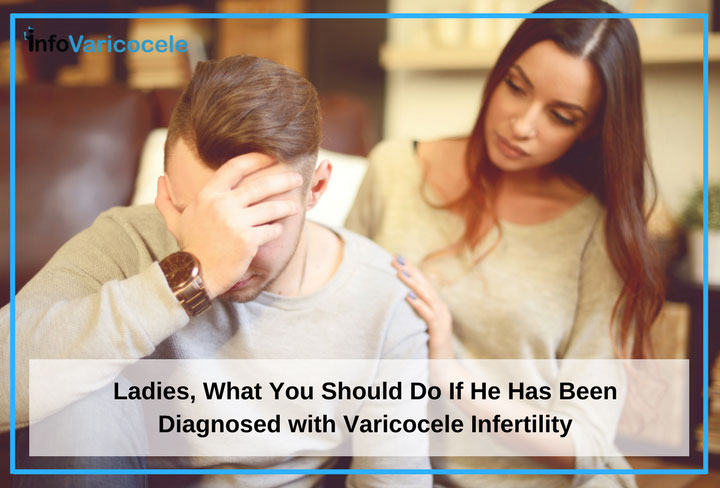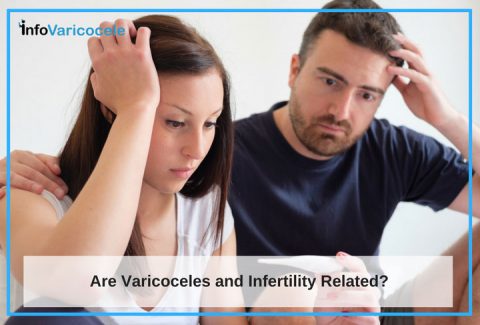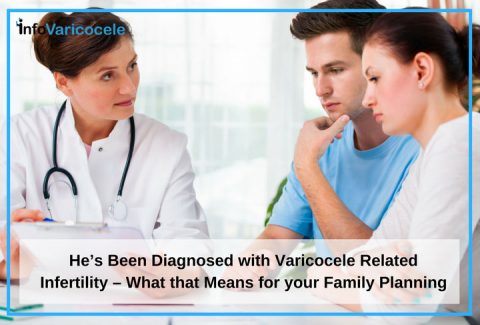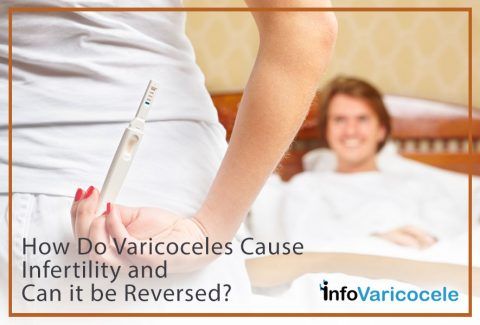
Did you and your partner just return from the fertility specialist? Is your mind still reeling from the diagnosis? Or have you had some time to process things, and now you’re wondering what to do next?
If you’ve been evaluated for infertility, defined as not being able to get pregnant after 1 year of unprotected intercourse, you may have already learned that the reason that you, as a couple, cannot get pregnant is the result of a varicocele.
There are some basic things you should know about varicoceles
- The first thing to keep in mind is that varicoceles are a common condition, affecting about 15% of men in the general population.[i]
- A varicocele is an enlargement of the veins in the scrotum that may have been caused by poorly functioning valves in the veins, similar to varicose veins of the leg.
- Varicoceles are found in 40% of couples with infertility.[ii]
- If you’re hoping to have children, it may still be possible.
- Surgery is not the only treatment option
RELATED DOWNLOADABLE GUIDE: Varicoceles and Infertility
The best thing you can do if your partner has been diagnosed with a varicocele is be supportive and help him find the information that he needs.
What You Can Do After He’s Been Diagnosed with Varicocele Infertility
If your husband or boyfriend has been diagnosed with varicocele infertility, here are some ways you can support him while you both consider what to do next.
Reassure Him
Having a varicocele is not his fault. Doctors are unsure exactly why varicoceles occur in some men but not others, but they’re not considered to be something that can be prevented. Still, many men find it hard not to blame themselves for being the one with a fertility problem. Varicoceles are thought to happen because the veins dilate in response to increased pressure within the blood vessels. This can happen because:
- Valves within the blood vessels are leaky and allow blood to flow backwards.
- The connection between the veins may prevent forward flow, causing blood to back up in the veins, enlarging them.
Help Him Gather Information
After you’ve helped reassure him that he did nothing to cause his varicoceles, now you’re ready to get the information both of you need to take the next steps.
It’s helpful to determine if treatment is necessary. Varicocele treatment should be considered if there is an abnormal sperm count or problems with sperm health. To better understand his options, you can help him research varicocele infertility treatment options. Varicocele infertility can be treated with surgery, or through a less invasive procedure such as varicocele embolization.
Learn More About Varicocele Surgery
Surgery for the treatment of varicocele infertility is called varicocelectomy. A urologist is the type of surgeon who typically performs this procedure.
- The open and microsurgical approaches involve an incision in the groin. The blood vessels causing the varicocele are identified and tied off.
- The laparoscopic approach requires several small incisions near the groin and lower abdomen to accommodate a camera and other surgical equipment to locate the blood vessels and tie them off.
- Recovery time for varicocele surgery is about 3 weeks. There are several approaches that can be used.
Look into Varicocele Embolization
Surgery is not the only available option for effective varicocele treatment. Varicocele embolization is an image-guided, minimally invasive option for treating varicocele infertility and is performed by an interventional radiologist. Using x-ray images, a catheter is placed in the veins that flow into the varicocele and a small coil and/or a scarring agent, is used to seal off affected veins and redirect the blood flow away from the varicocele, towards healthy veins. Recovery time ofr varicocele embolization is an average of 1-2 days.
You should search for an interventional radiologist who specializes in performing varicocele embolization for the treatment of varicocele infertility. After you’ve found the right interventional radiologist, the next step is to set up an appointment for your partner to further discuss the procedure and learn more about what to expect with varicocele embolization.
RELATED: Is It Really Necessary to Have Varicocele Surgery to Help with My Infertility?
Understand More About Fertility After Treatment
What really matters to both of you, is whether or not your chance of getting pregnant is better after some type of varicocele infertility treatment. Here’s the good news: varicocele infertility is treatable, and it’s possible for a couple to become pregnant after treatment. After varicocele surgery, varicoceles may recur in about 10% of men and up to 30-50% of couples will become pregnant.[iii] Varicocele embolization is successful 90% of the time, and close to 50% of couples will become pregnant.[iii, iv]
By now you should have a better sense of how you can help your partner learn about and seek treatment for varicocele infertility. It helps to know and understand all of your treatment options. If you have been told that varicocele surgery is the only treatment, seek a second opinion to see if he is a candidate for varicocele embolization. Find the interventional radiologist specialists in your area who perform varicocele embolization. Then set up consultations to determine which treatment option is the best for him.
Sources:
i Choi, W., and Kim, S., Current Issues in Varicocele Management: A Review. World J Mens Health, 2013. 31(1): p. 12-20. http://wjmh.org/DOIx.php?id=10.5534/wjmh.2013.31.1.12 (accessed 8/1/2016)
ii American Society for Reproductive Medicine, Male Infertility. http://www.reproductivefacts.org/topics/detail.aspx?id=1331 (accessed 7/31/2016)
iii Kupis, L., Dobronski, P.A., Radziszewski, P., Varicocele as a source of male infertility – current treatment techniques. Cent European J Urol, 2015. 68: p. 365-370. http://www.ncbi.nlm.nih.gov/pmc/articles/PMC4643713/ (last accessed 7/31/2016)
iv Cantoro, U., Polito, M., Muzzonnigro, G., Reassessing the role of subclinical varicocele in infertile men with impaired semen quality: a prospective study. Urology, 2015, 85(4): p. 826-30. http://www.ncbi.nlm.nih.gov/pubmed/25817105 (accessed 8/4/2016)


